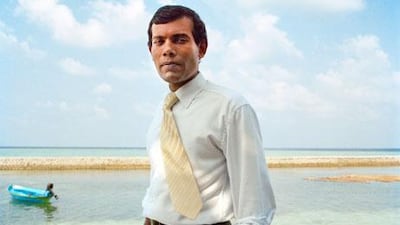Along with Brad Pitt and George Clooney, Mohamed Nasheed, president of the Maldives, was in Toronto this week. And like Clooney and Pitt, Nasheed was starring in a film at the Toronto International Film Festival.
Except Nasheed, 44, isn't your typical movie star. He didn't bring a fictitious character to life, nor portray a man in history. He was, instead, being himself, as the protagonist of The Island President, a documentary observing his battle to address climate change and halt the rising of the Indian Ocean - a disaster that threatens to submerge a country and culture that have been there for thousands of years.
Sometimes Nasheed's language has an urgency that sounds right out of a disaster epic. "If you can't defend the Maldives today, you can't defend England tomorrow," he tells his speech writer, preparing in the film to address the British parliament in 2009.
"We know that the Maldives becoming carbon-neutral is not going to stop us from annihilation," Nasheed declares, "but at least we can die knowing that we've done the right thing."
Strong words from a leader who, in public and in private, argues gently and with a quick wit.
Nasheed is a smallish man, so the David-and-Goliath face-off of the Maldivian president versus the elements in a place that Nasheed calls "a cross between paradise and paradise" seemed right for Jon Shenk, the documentary's director.
"We wanted to follow an extraordinary guy who essentially was doing the work of trying out how to save the planet," Shenk said. "It sounds ridiculous to say it out loud, but that's what he thinks about when he gets up every day."
Nasheed agreed right away to the project, which he now calls "diplomacy by other means".
Shenk's previous documentary, The Lost Boys of Sudan, followed young men orphaned by war who spend years trying to get to the United States. Those missions seemed near-impossible, until you compare them with what Nasheed sets out to do: achieve carbon neutrality at home by 2019 in spite of an imperfect deal at the 2009 United Nations Climate Change Conference in Copenhagen on global warming's damage.
"As a president, it seems to me that the most important right is the right for our survival," he says forthrightly, smiling, as he often does when speaking of potential cataclysm. "It won't be any good to have democracy if we don't have a country."
The Island President begins as azure seas erode that country of some 2,000 islands and islets, which lie 1.5 metres above sea level and is a favourite honeymoon spot for many couples marrying in the UAE.
With archival footage, the documentary traces Nasheed's path as an often-jailed political dissident in the Maldives, and his election in 2008. Even with democracy, paradise was in trouble. The oceans were rising and the 2004 tsunami ruined the local economy.
Nasheed is determined to persuade the world's powerful countries to recognise the threat of climate change.
Sitting in a Toronto hotel room, he admitted that it was a work in progress, but a crucial one. "If we didn't have an idea or a vision of how we were going to deal with this, it's quite impossible to see how we would deal with education, for instance," he said. "What's the point, of anything?"
Disarming and direct, Nasheed couldn't be more different from Al Gore, the former US vice president whose film on climate change, An Inconvenient Truth, showed the recurring image of a polar bear swimming for its life in rising Arctic waters.
By contrast with Gore's languid, often wooden demeanour, Nasheed has an infectious energy. The camera races to keep up with him. He says he's an admirer of An Inconvenient Truth, although it would be hard to imagine Nasheed making his arguments, as Gore does, using a PowerPoint presentation. It's just as hard to imagine Gore holding a cabinet meeting, as Nasheed did, underwater. Nasheed is also a smoker, which is heresy for an American environmentalist.
Nasheed grinned when asked how he stays in power, faced with the task of staving off an aquatic apocalypse and asking his country for patience. "Any Maldive leader has to have a vision on how they would save the country. The science of it has been so talked about and believed and understood - but then you have to have a vision," he said.
One battle that he doesn't have to fight is convincing his citizens that climate change is a reality. "The science is just a confirmation of what is happening in the Maldives. There are people who don't believe that the world is round. There are people who don't believe that a man landed on the Moon. There can be scepticism on anything, but what is happening to the Maldives is very obvious," he said.
"So, please, give us another scientific rationale for what is happening to the Maldives - if not, it is from climate change."
Another argument Nasheed addressed, always politely, was the notion that Canada, with plans to refine oil in vast tar sands reserves, could wait on shifting behaviour that warms up the planet.
"We change technology not because we have exhausted the raw material for a certain technology," he said. "We didn't come out of the Stone Age because we ran out of stones. There's still a fair amount of them around. You switch, you change, because there's nothing more that you can milk out of it."
Such observations have made Nasheed a man to watch, even before The Island President. As his visibility grows, tourism to the Maldives is surging, especially among Chinese visitors, whose government opposed Nasheed at the 2009 Copenhagen conference.
"It's given them more of an impetus," he notes, grinning again. "Buy, if the stock lasts."

